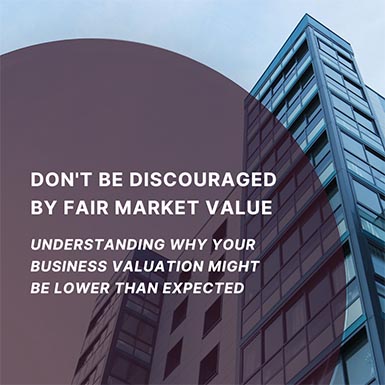Don’t Be Discouraged by Fair Market Value
Understanding Fair Market Value (FMV) and How It Differs from "Street Value"
Fair Market Value? It’s GOT to be Worth MORE!
“This value is too low! I could sell my business for more than this!”
I’ve heard this more than once from many clients and attorneys. Completing valuations under the Fair Market Value (FMV) Standard of Value reflect values that most business owners, at first glance, do not agree with or understand. And they shouldn’t since FMV is not intended to be the “street value” of the business.

What is FMV?
FMV is largely an historic creation of the US tax code and regulations. IRS Revenue Ruling 59-60 created a definition for FMV that remains a cornerstone of the methodology and standards used to evaluate the FMV of businesses that are not traded on any open market. FMV does not mean “price.” Although the Revenue Ruling is over 60 years old, it is still the standard for tax reporting – gift and estate situations for example – and is often used for measurement in contracts and some business disputes.
Revenue Ruling 59-60 defines FMV as “the price at which property would change hands between a willing buyer and a willing seller, neither being under any compulsion to buy or sell, and both having reasonable knowledge of relevant facts.”
Key Aspects of Revenue Ruling 59-60
Revenue Ruling 59-60 outlines several factors that business appraisers must consider when determining the FMV of closely held stock, especially when there is no active market for that stock. These factors include:
- The nature of the business and the history of the enterprise from its inception.
- The economic outlook in general and the condition and outlook of the specific industry.
- The book value of the stock and the financial condition of the business.
- The earning capacity of the company.
- The dividend-paying capacity.
- Whether or not the enterprise has goodwill or other intangible value.
- Historical sales of the stock and the size of the block of stock to be valued.
- The market price of stocks of corporations engaged in the same or a similar line of business having their stocks actively traded in a free and open market, either on an exchange or over the counter.
A business is an owner’s baby…Seeing a value that is less than they initially expected can be disheartening.
Plain English: Application in Business Valuation
Here’s how we often describe what FMV is to our clients.
- The “buyer” is hypothetical, not any one specific buyer. All of the unique business and personal characteristics and issues that might impact an actual deal are ignored. To carry this further, FMV ignores that the buyer or seller or both are actual, known people.
- It’s viewed as a financial transaction. Synergies are ignored. In most business transactions, a key driver of “price” is what a real buyer believes they will financially accomplish because of the purchase or merger. This is not so in FMV where the hypothetical buyer isn’t buying to capitalize on potential synergies and new strategies. What you see is what you get — you’re buying it for a profit motive based on the businesses existing operating, product, and market characteristics.
- The deal is for cash. Deal terms, like seller financing or earnouts, influence what a buyer is willing to pay, and a seller is willing to accept. While these additional terms are key to pulling real deals together, they are ignored under FMV.
- The buyer and seller are fully informed about the business and the transaction. Sounds nice, but the reality is that uncertainty lurks on both sides in real transactions regardless of the due diligence employed and the skill of the parties.
The level of control resulting from a transaction heavily impacts the value in both FMV and actual transactions. If you purchase a minority interest in a privately held business under FMV, you’re buying the interest for the cash flows and potential appreciation in price. However, if you acquire control of the privately held entity, you have the purview to take whatever actions you believe justified to maximize or manage the cash flow. In FMV, a lot of energy is expended clarifying the impact of control and liquidity.
If Not FMV Then What Is This Value?
There are over 20 different “standards of value.” We refer to the price paid between actual financial buyers and seller as investment value. It can get far more granular. For example, we are often asked to compute the synergistic price of a transaction where a buyer wants to know the maximum price to pay based on execution of a buyer’s perceived synergies or strategies.
Importance and Conclusion
Discussions about FMV have been an important part of my initial conversations with clients. Businesses are an owners’ babies. There’s heavy emotion in their years of work building them, rightfully so. Seeing a value that is less than they initially expected can be disheartening. However, we typically agree, you could more than likely sell the business for more to the right buyer.
About the Author
Grant Kramer, CPA, is a Consulting Manager with BW Arpeggio in Salt Lake City, Utah. He focuses attention on enterprise valuation in estate and gift, M&A and transaction advisory, and operational consulting.
Grant Kramer, CPA
gkramer@bradyware.com
Mobile 801.807.8081